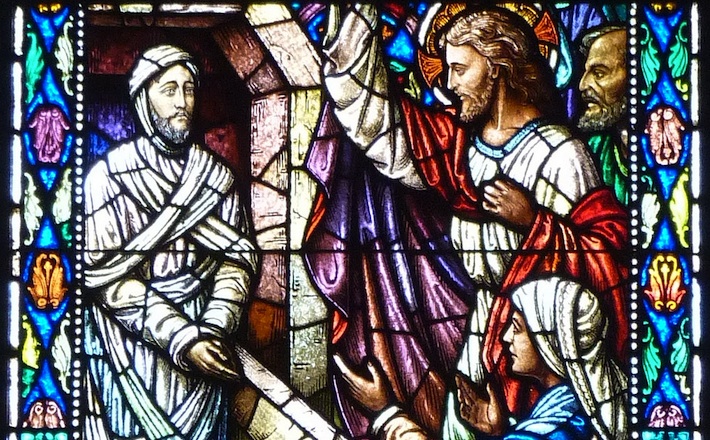Commentary on Isaiah 25:6-9
All Saints Sunday is a day to remember those who have died. It is difficult to do so without remembering that we are going to die too.
A good friend of mine was killed in an automobile accident when he was sixteen. My mother died when I was seventeen and my father when I was twenty. For some reason, I strongly sensed my mortality before any of those deaths occurred. It’s strange to me that I’ve thought less and less about my inevitable death as I’ve gotten older.
And I am getting older.
I turned sixty a few weeks ago. I remember when I thought sixty-year-old people were old. Now, I think of them as middle-aged (because I know so many 120-year-olds!). In recent years, I’ve spoken at the funerals of two of my childhood friends. In recent days, I’ve learned of the deaths of two of my contemporaries from my hometown.
Maybe I should start thinking more about my mortality. Maybe we all should.
An All Saints Sunday sermon offers an opportunity to proclaim the hope we have in God as we face the reality of being mortal people living in a broken and dangerous world. Isaiah 25:6-9 helps us do that.
What is
Our passage occurs within Isaiah 24–27, a distinct unit within the book of Isaiah. Because of its intense interest in the future and a supposed affinity with apocalyptic writings, this section is often called the Little Apocalypse of Isaiah. More recent scholarship downplays the apocalyptic nature of these chapters, but there is no denying their interest in God’s future working out of God’s purposes.
But in anticipating a glorious future, Isaiah 25:6-9 acknowledges a difficult and challenging present for its original readers. Whether this passage (and Isaiah 24–27 as a whole) originates with Isaiah of Jerusalem or with exilic or post-exilic writers and editors (as seems most likely), it acknowledges that the people being addressed experience death. The text may have in mind the deadly experiences of warfare and exile that Israel and Judah have encountered, but the fact that the passage addresses “all peoples” (Isaiah 25:6) leads us to consider the universal experience of death.
All individuals die. “All peoples” in the sense of “all nations” are also subject to death. The mighty empires — whether of Isaiah’s time, the exiles’ time, the post-exilic period, or our era — are at risk of dying. Moreover, “death” can refer to experiences other than literally dying. The people may experience such severe physical, emotional, social, or spiritual deprivation that they feel like they’re dying.
The book of Isaiah explicitly talks about such negative experiences in other places, including Isaiah 24–27. They are implicit in our passage’s proclamation of a much brighter future.
What will be
Our passage further develops a theme first addressed in Isaiah 2:1: “In days to come the mountain of the Lord’s house shall be established as the highest of the mountains, and shall be raised above the hills; all the nations shall stream to it” (verse 2). Now we read that God is going to bring about the promised wonderful future “on this mountain” (verse 6), which is Mount Zion. And the glorious future will include not only Israel but “all nations.”
This future will feature communal celebration. The Lord will provide a bountiful feast (Isaiah 25:6) that all nations will enjoy together. The divisions and conflicts that take away so much joy from life will be gone as all nations fellowship with each other and with God. (This part of the text could be the basis for an excellent Communion sermon.) God’s great future will include full provision and complete community.
This future will also feature life without death. The Lord “will destroy on this mountain the shroud that is cast over all peoples, the sheet that is spread over all nations; he will swallow up death forever” (Isaiah 25:7-8a). Death covers all peoples and all nations in the sense that everyone dies. It also shrouds them in the sense that it is a dread and a threatening presence. The awareness that death is coming for us and for our loved ones can be oppressive. But those who share in God’s great future will know only life. They will never have to mourn again, for “the Lord GOD will wipe away the tears from all faces” (verse 8a).
These are the things the text looks forward to. They haven’t happened yet. Oh, the exiles got to return home. They rebuilt Jerusalem and constructed a new temple. The nation even had a brief period of independence under the Hasmoneans. But nothing like what this text describes has happened yet, has it?
What is redux
We thought about “what is” in an earlier section; the subject there was the difficulties that the first readers of this passage faced. Let’s revisit “what is” with a focus on us. What is our present situation?
Well, we still live with death, and many of us live with the dread of death. We still live with physical, emotional, social, and spiritual deprivation. We still live with divisions between nations and with divisions between people within nations and within communities. We still look forward to that day when God will make things right, will bring people together, and, most significantly for this Sunday, will destroy death forever.
The New Testament also looks forward to that day. Revelation 21:1-6a (the lectionary’s second reading), contains words reflecting the hope of Isaiah 25:6-9: “(God) will wipe every tear from their eyes. Death will be no more; mourning and crying and pain will be no more, for the first things have passed away” (Revelation 21:4). Given that Revelation expresses the same hope as a text written six or seven centuries before it, has nothing changed?
Yes, something has changed. Jesus has come. Jesus has lived, died, and risen. This Sunday’s Gospel text is the story of Jesus raising Lazarus (John 11:32-44), which demonstrates the life-giving power of Jesus. As the New Testament makes clear, we can experience that life-giving power here and now, even though we still await the glorious fulfillment of all things when death will be no more. We still live with death. But because of Jesus, we live with life, and that gives us even greater hope.
Isaiah 25:9 says, “It will be said on that day, Lo, this is our God; we have waited for him, so that he might save us. This is the Lord for whom we have waited; let us be glad and rejoice in his salvation.” Jesus has already come, but we still wait. We wait for his return. We wait for God’s salvation to be fully ours. But we wait knowing not only that the Lord will come, but that he has come.
There was hope in the present that Isaiah 25 originally addressed. There is even greater hope in our present, because we live on this side of Jesus’ life, death, and resurrection.


November 4, 2018